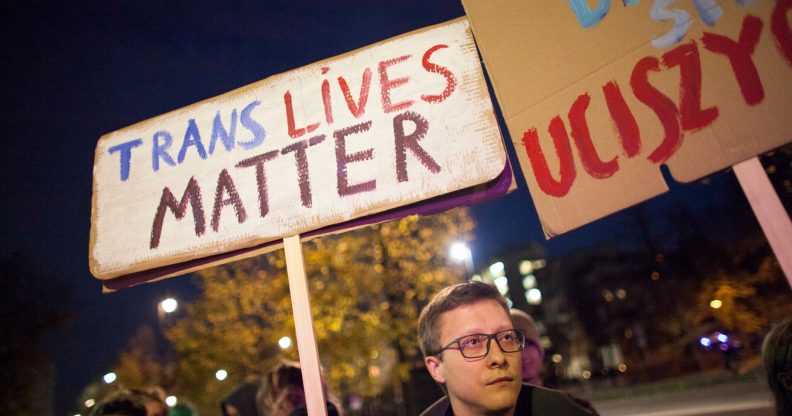Cruel lawmakers ring in 2022 with swathe of ‘dangerous’ anti-trans bills across the US

Protestor holds ‘Trans Lives Matter’ placard during protest in Warsaw, 2018. (Getty/Maciej Luczniewski)
Within the first week of 2022, seven US states have proposed nine bills that would roll back the rights of trans and non-binary youth.
These proposed bills will negatively impact trans and non-binary youths’ right to privacy, restrict their ability to take part in sports and limit access to gender-affirming healthcare.
Under Arizona’s proposed SB 1045 bill, it would be illegal for school staff to keep a transgender child’s gender identity private, which would forcibly out trans children to their parents, according to Insider. Similar laws are also being proposed in other states, such as Alabama.
In contrast, major sports organisations, such as the National Collegiate Athletic Association (NCAA), allow transgender and non-binary individuals to participate in teams that match their gender identity undearr particular conditions. Last year, the NCAA Board of Governors emphasised that they “firmly and unequivocally” supported transgender students participating in competitive sports at college-level.
Additionally, SB 1045 would prohibit medical professionals from offering any sort of gender-affirming healthcare to transgender children and youths. This is particularly concerning, given that gender-affirming healthcare is often life-saving for transgender individuals. The American Medical Association has opposed bills such bills, cautioning that anti-trans bills could lead to “tragic health consequences, both mental and physical.”
Arizona‘s second anti-trans bill would exclude transgender children from taking part in competitive school sports teams, as the bills seeks to force schools to arrange sports teams based on assigned sex at birth. Similar bills are being proposed in South Dakota.
Anti-trans bills have also been proposed in Indiana, Kentucky, Oklahoma and New Hampshire.
According to Chase Strangio, the deputy director for transgender justice at the ACLU LGBT and HIV Project, lawmakers are attempting to “avoid accountability and judicial review” when designing these bills. In particular, Strangio believes these bills try to escape accountability by seeking to “deputise private individuals to act as government officials to essentially be the people enforcing the law through private lawsuits”, rather than relying on government enforcement.
Trans rights advocate Gillian Bransetter has expressed concerns that this is becoming “a race to the bottom among legislators who are in a competition to see who can do the most harm to trans kids”.
She added: “It is a hostile and dangerous trend that I’m sure we’ll see continue through the year.”
According research by the Trevor Project, 94 per cent of LGBT+ youth believe that recent politics have had an negative effect on their mental health.
Speaking to PBS, researcher Jonah DeChantis explained: “It is this cumulative onslaught of having your right to participate in society be attacked that can really cause folks to be at elevated suicide risk and increased negative mental health [for transgender youth].”
“These bans, whether they are about health care or sports, are simply opportunities to discriminate and continue to stigmatise trans and non-binary youth and their identities.”
According to DeChantis, who works at the Trevor Project, increasing numbers of transgender and non-binary youth in Texas are turning to help from crisis services after “the onslaught of over 40 anti-trans bills” proposed in Texas last year.
Last year, more than 130 anti-transgender bills were proposed across 33 states in the US, according to a report by the Human Rights Campaign. A total of 13 anti-transgender bills were enacted last year in the US, across eight states. 2021 was also the deadliest year on record for transgender and gender non-conforming people, with 47 transgender and gender non-conforming people being murdered.
Reflecting on the tragedies from last year, Tori Cooper from Human Rights Campaign said: “We need everyone to join us in empowering transgender leaders, building safer, stronger communities and reducing stigma. We cannot rest until all transgender and gender non-conforming people can live our lives safely as our full selves.”

